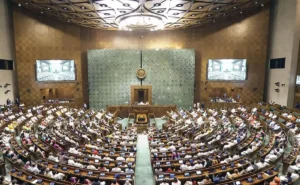GS 2 Governance

Context:
The Monsoon Session, 2025 of Parliament commence on Monday the 21st July, 2025 and subject to exigencies of Government Business, the session may conclude on Thursday, the 21st August, 2025.
- Constitutional Basis
- Article 85
- President summons each House “from time to time”
- Cannot allow gap of > 6 months between two sessions
- Article 86
- President’s right to address either House or both Houses
- Types of Sessions
| Session | Typical Months | Main Focus |
| Budget Session | Feb – May | → Presentation & passing of Annual Financial Statement (Budget) → Demand for Grants → Finance Bill & Appropriation Bill |
| Monsoon Session | July – September | → General legislative business → Discussion on Supplementary Demands |
| Winter Session | Nov – Dec | → Urgent legislation → Review of ongoing bills |
- Parliament also meets in Special Sessions (e.g., for national crises, commemorations).
• Joint Session (Art.108) can be summoned if Lok Sabha & Rajya Sabha disagree on a bill.
- Key Procedural Concepts
- Summoning: President issues summons—date & agenda (via Secretary-General)
- Prorogation (Art.85): President ends a session; pending business lapses (except Money Bills)
- Dissolution: Only Lok Sabha; automatically six months after prorogation if not dissolved earlier
- Adjournment vs. Adjournment sine die
- Adjournment suspends sitting to a fixed time
- Adjournment sine die suspends without fixing next date
- Quorum, Hours & Special Movements
- Quorum: 10% of total strength (i.e., 55/545 in Lok Sabha)
- Question Hour (11 AM–12 PM): Ministers orally answer starred and unstarred questions
- Zero Hour (immediately after Question Hour): MPs raise urgent matters (no formal rule)
- Calling Attention Motion, Adjournment Motion, No‑Confidence Motion
- Legislative & Financial Business
- Money Bills (Art.110) can only be introduced in Lok Sabha; Rajya Sabha must return within 14 days
- Appropriation Bills and Finance Bills form part of financial business
- All non‑money bills → first reading, second reading (general discussion + clause‑by‑clause), third reading
- President’s Address
- Delivered at the first sitting of each session (usually Budget Session) → outlines government’s agenda
- Followed by debate (“Address‐in‐Reply”) and vote
- Important Facts
- Maximum interval between sessions: 6 months
- Lok Sabha strength: 545 Members (543 elected + 2 nominated Anglo‑Indians; nomination ceased after 104th Amendment)
- First session: 13 May 1952
- Recent Practice: Three regular sessions + occasional special sittings




